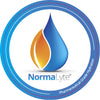ORS vs. Salt Pills: Which is Better for POTS?


You have POTS.
What was my first clue? Well, it could be that you passed out in front of me. Don't worry, I didn't call an ambulance - I have POTS too. And, not only that, I have something in my bag that can help; an oral rehydration salt.
What's that? You've never heard of ORS? Oh boy! Let's talk about it.
WHAT IS POTS
First, let's take a super quick look at what POTS is for the people gawking at us. POTS, or postural orthostatic tachycardia syndrome, is a form of dysautonomia that affects the way your autonomic nervous system controls the way your body functions.
Symptoms like: brain fog, feeling like you'll pass out (or actually passing out!), dizziness, feeling lightheaded, rapid heart rate, and more.
One way to manage POTS is to increase salt intake. This helps to retain fluid, which can help to prevent the blood pressure from dropping too low when standing up. Which is something that is super common with POTS patients. There are two ways to increase salt intake: ORS and salt pills.
Salt Pills
Salt pills are tablets or capsules that contain salt. Salt pills are more convenient to take than ORS, but they do not contain all of the electrolytes that are essential for fluid balance. Salt pills can also be difficult to absorb, so they may not be as effective at rehydrating the body quickly.
ORS
Oral rehydration salts (ORS) are a solution that contains electrolytes, which are essential for fluid balance. Learn more about what electrolytes are here. ORS is a more complete way to rehydrate the body than salt pills because it contains all of the electrolytes that are essential for fluid balance. ORS is also easier to absorb than salt pills, so it is more effective at rehydrating the body quickly.
Oral rehydration salts were proven by the World Health Organization to be the most effective and quickest way to rehydrate a person.
Being easier to absorb also means that ORS is often more gentle on your stomach. Salt, when consumed alone, can cause stomach upset and nausea.
Which is Better for POTS?
Which is better for POTS patients, ORS or salt pills? It depends on your individual needs. If you are looking for a complete way to rehydrate the body quickly, then ORS is the better option.
However, if you are looking for a more convenient way to take electrolytes, then salt pills may be a better choice.
Here is a table that summarizes the pros and cons of ORS and salt pills for POTS patients:
| ORS | Salt Pills |
|---|---|
| Pros | Pros |
| Contains all of the electrolytes that are essential for fluid balance | More convenient to take |
| Easier and faster to absorb | Quick way to ingest a lot of salt at one time. |
| Can help to prevent fainting | |
| Can be taken with other medications | |
| Cons | Cons |
| Can taste salty or sweet | Does not contain all of the electrolytes that are essential for fluid balance |
| Can be difficult to absorb |
Which is better overall?
Cool, cool. But, which is better for hydration, ORS or salt pills?
There's not a one size fits all answer here. Everyone is different for what works for them. It depends on your individual needs. If you are looking for a complete way to rehydrate the body quickly, then ORS is the better option. However, if you are looking for a more convenient way to consume large quantities of salt, then salt pills may be a better choice for you assuming your stomach can tolerate the mega dose of sodium.
Which brings up this point. Unless you're consuming a large amount of water with your salt pills your body will ultimately toss out the sodium without properly absorbing it. This often leads to gastrointestinal effects like nausea and upset stomach.
ORS is Clinically Proven
We would be remiss if we didn't talk about the clinical trial on POTS patients. In the clinical trial, done by Dr. Julian Stewart and others, shows that ORS is clinically effective at managing symptoms of POTS. Here's the results directly from the study:
Results: Subjects with POTS exhibited reduced tolerance to LBNP (P < .0001) compared with controls (Orthostatic Index of 35 715 ± 3469 vs 93 980 ± 7977, respectively). In POTS, following ORS but not saline infusion, cerebral blood flow velocity (CBFv) was significantly higher than that with no treatment, at -45 mm Hg (P < .0005). Although fluid loading did not confer any advantage in controls, subjects with POTS experienced a significant improvement in orthostatic tolerance following both saline infusion (100 ± 9.7 vs 134.5 ± 17.4; P < .05) and ORS (100 ± 9.7 vs 155.6 ± 15.7; P < .001) when evaluated by normalized orthostatic index (P < .001, compared with untreated baseline).
What that means to you: ORS has been proven to manage your symptoms as effectively as IV saline infusion.
NormaLyte is an oral rehydration salt. That distinction is important. Not all electrolytes (like Liquid IV or Drip Drop) are equal in the way they will help you maintain fluid levels. Just taking salt tablets likely won't help you manage symptoms of POTS in the way that an ORS will.
Ultimately, the best way to decide which is right for you is to talk to your doctor. They can help you to determine your individual needs and recommend the best way to rehydrate your body.









Do the flavored products contain Stevia? I am allergic to Stevia and would like to know which of your products would be safe for me.
Hello, my daughter is looking for a POTS diagnosis, in the meantime, salt does help. ORS seems like a better solution. I requested the sample list. My question is – does your ORS contain any iodine? She’s on a low-iodine diet for 2 weeks to prepare for for Radio-Iodine treatment – she had her thyroid removed 2 months ago because of papillary cancer. The Low Iodine diet basically restricts any salt except Kosher, which will exasperate her PoTS. Want to make sure the OSR has NO Iodine. Can you confirm. Thank you.
Leave a comment